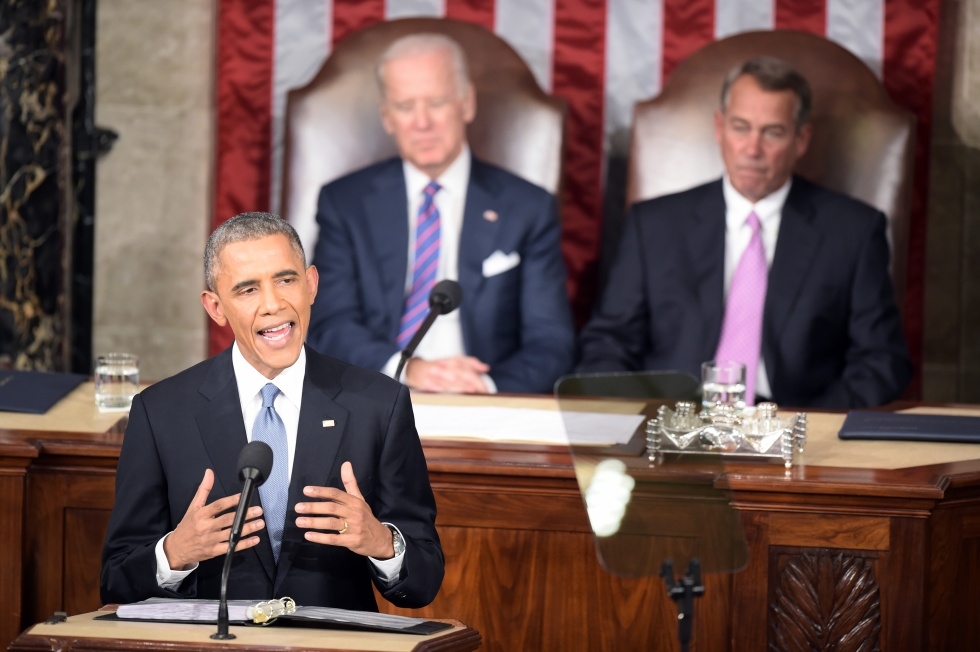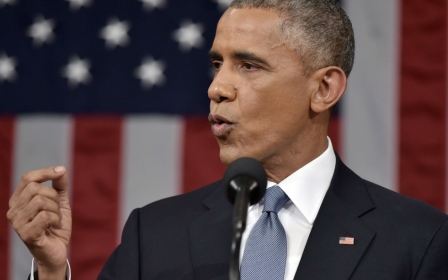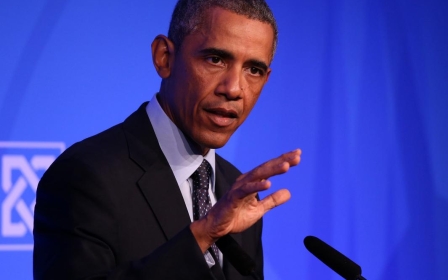ANALYSIS: Obama speech signals retreat from Mideast

NEW YORK – The US president’s State of the Union address is a set piece on the political calendar that typically plays to a home crowd. This was true on Tuesday night, when Barack Obama made few references to the Middle East, which has at other times been central to US strategy.
Obama said the US was less reliant on foreign oil nowadays, praised troop pull-outs from Iraq and Afghanistan, and offered a domestic vision of “middle-class economics” and taxing the rich so that the economic recovery is enjoyed by ordinary Americans.
“This speech was about the middle class, not the Middle East,” Joshua Landis, a University of Oklahoma professor, told Middle East Eye. “Obama’s narrative was one of strength at home, leading by example and being part of international coalitions.
“He was at pains to avoid talking about the Middle East – and that’s smart.”
In his sixth State of the Union address, Obama cautioned against “rash decisions” and “getting drawn into unnecessary conflicts”. A “smarter kind of American leadership”, Obama said, involved working with foreign leaders to fight terrorism “from South Asia to North Africa”.
He did highlight some Middle East issues, such as talks over Iran’s nuclear program, Islamic State (IS) group fighters in Iraq and Syria, and global efforts to combat violent Islamic extremism, via reference to the Charlie Hebdo massacre in Paris.
But other topics – such as Egypt, Libya, promoting democracy, or the Arab Spring – were not uttered. Israel was mentioned only once, in a fleeting reference to US allies, while deadlocked peace talks with the Palestinians were not addressed.
“The Middle East is a mess. There are no answers, nobody has any,” Allan Lichtman, a history professor at American University, told MEE. “It wasn’t going to be part of speech that Obama wanted to be upbeat and positive.”
Still, Obama touched on a handful of Middle East issues in his State of the Union speech.
Iran
Talks between Tehran and six powers – Britain, China, France, Germany, Russia and the US – have been extended until the end of June, in the hope of reaching a deal on curbing an Iranian nuclear scheme that the West fears could yield atomic weapons. Obama said: “For the first time in a decade, we’ve halted the progress of its nuclear program and reduced its stockpile of nuclear material.”
He told a Republican-dominated Congress he would veto any new sanctions on Iran, saying they would undermine talks. “The American people expect us only to go to war as a last resort,” he added.
Tamara Wittes, of the Brookings Institution, a DC-based think tank, said Obama fears new US sanctions will not only force Tehran out of the talks – but also hurt the group of nations that are helping to check Iran.
“Whether a deal happens or not, that international coalition is what pressured Iran to the table so far, and what will keep Iran contained in the future,” she said. “To preserve that coalition, it’s important that the US be seen as acting in good faith and doing its utmost to achieve a negotiated outcome.”
Islamic State
A US-led coalition of Western and Arab countries is struggling to combat IS, which is also known by the acronyms ISIS and ISIL, an extremist religious militia that controls swathes of territory on either side of the Iraq-Syria border.
Obama said US leadership is “stopping ISIL’s advance” but warned that the “effort will take time”. He urged Congress to pass a “resolution to authorise the use of force against ISIL”, which is currently being waged under the 2002 Congressional authorisation for the Iraq war.
Analysts have warned that defeating IS will take years – perhaps even decades - and involve a broader global effort against Islamic extremism. Lichtman, from Washington University, said there is no appetite for deploying large numbers of US forces to Iraq or Syria.
“Some neo-conservatives may want to reignite US wars in the Middle East, but the American people have no stomach for it. As we learned in Vietnam, a lack of public support makes wars very hard to prosecute,” he told MEE.
Israel/Palestine
Making peace between Israelis and Palestinians was a foreign policy priority for Jimmy Carter, Bill Clinton and other former US presidents. The results have been disappointing. The latest US-backed talks, led by Secretary of State John Kerry, collapsed in acrimony in April last year.
In his speech, Obama mentioned Israel only once, and did not discuss peace negotiations with the Palestinians. Recent US criticism of Palestinian efforts to join the International Criminal Court (ICC) has not come from the president, nor Kerry, but lower-level spokesmen.
Ian Bremmer, president of the political risk firm Eurasia Group, said Kerry wasted precious time on dead-end talks. “The top foreign policy official in the world spending his first two years on that is fireable,” he said. “It’s not that I don’t want it fixed; I’d love it fixed. We’re not fixing it.”
Religious extremism
Attacks by Islamic extremists on the Paris offices of satirical magazine Charlie Hebdo and a kosher supermarket in the French capital put global efforts to combat militant religious extremism back at the top of the agenda.
Obama stressed the need to fight terrorism in coalition with foreign governments. In wide-ranging comments, he rejected “offensive stereotypes of Muslims” but chose to “defend free speech”. He said he has “prohibited torture”, ensured drone use is “properly constrained”, and again promised to close the detention centre at Guantanamo Bay that houses suspected terrorists.
According to Landis, greater US cooperation with Middle East governments in the fight against extremism will trump the calls for more democracy in the region that featured in the Arab Spring uprisings.
"Forget democracy, we’ve got to go back to supporting autocrats in Egypt, Saudi Arabia, and this new Iraqi government,” Landis told MEE. “It’s all about security, counterterrorism and fighting the rise of Islamic extremism in a world that is large, poor and has a lot of guns.”
New MEE newsletter: Jerusalem Dispatch
Sign up to get the latest insights and analysis on Israel-Palestine, alongside Turkey Unpacked and other MEE newsletters
Middle East Eye delivers independent and unrivalled coverage and analysis of the Middle East, North Africa and beyond. To learn more about republishing this content and the associated fees, please fill out this form. More about MEE can be found here.



